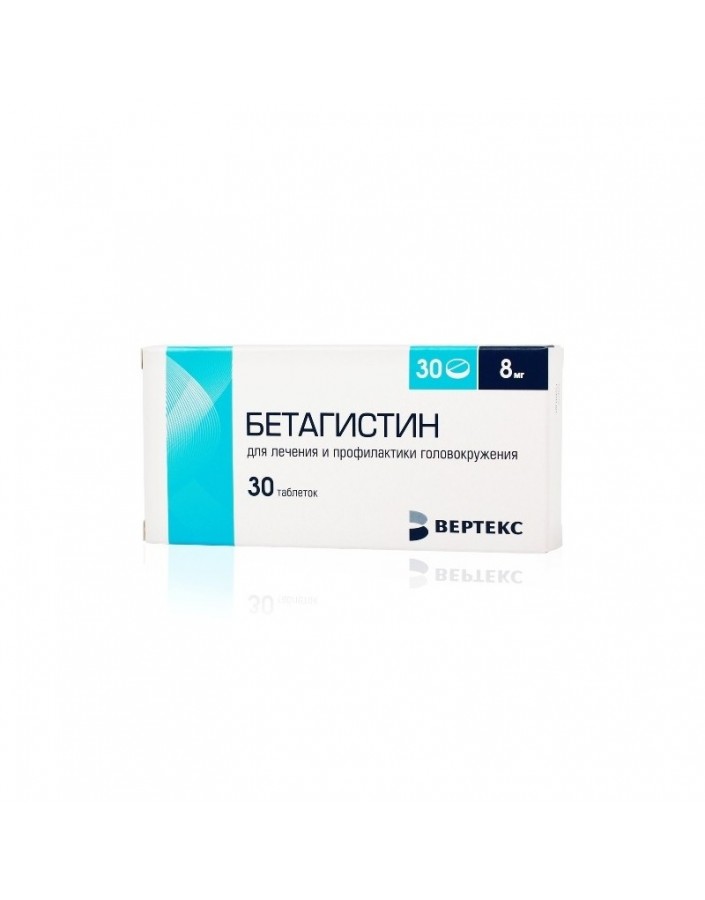




Security policy (edit with Customer reassurance module)

Delivery policy (edit with Customer reassurance module)

Return policy (edit with Customer reassurance module)
A drug that improves the microcirculation of the maze, used in the pathology of the vestibular apparatus. Betahistine acts mainly on histamine N1- and H3receptors of the inner ear and vestibular nuclei of the central nervous system. By direct agonistic effects on H1-receptors of the inner ear vessels, as well as indirectly through effects on H3-receptors improves microcirculation and capillary permeability, normalizes the endolymph pressure in the maze and cochlea. However, betahistine increases blood flow in the basilar artery.
It has a pronounced central effect, being an inhibitor of H3-receptors of the vestibular nerve nuclei. Improves conductivity in the neurons of the vestibular nuclei at the level of the brain stem.
The clinical manifestation of these properties is to reduce the frequency and intensity of dizziness, reduce tinnitus, improve hearing in case of a decrease.
Absorbed quickly, the degree of binding to plasma proteins is low. Cmax in blood plasma after 3 hours
T1/2 - 3-4 hours. Almost completely excreted by the kidneys as a metabolite (2-pyridylacetic acid) within 24 hours.
- treatment and prevention of vestibular vertigo of various origin;
- syndromes, including dizziness and headache, tinnitus, progressive hearing loss, nausea and vomiting;
- Meniere's disease or syndrome.
The drug is taken orally during meals.
Recommended doses:
Tablets of 8 mg: 1-2 tab. 3 times / day
Tablets of 16 mg: 1 / 2-1 tab. 3 times / day
Tablets 24 mg: 1 tab. 2 times / day.
Improvement is usually noted already at the beginning of therapy, a stable therapeutic effect occurs after 2 weeks of treatment and may increase within several months of treatment.
The treatment is long. The duration of the drug is determined individually.
Gastrointestinal: gastrointestinal disorders.
Allergic reactions: the appearance of hypersensitivity reactions of the skin (rash, itching, urticaria), angioedema.
- pregnancy (due to lack of data);
- lactation period (due to lack of data);
- age up to 18 years (due to lack of data);
- Hypersensitivity to any of the components of the drug.
with caution It should appoint a drug for gastric ulcer or duodenal ulcer (including in history), pheochromocytoma, bronchial asthma. Patients with these diseases should be monitored regularly during the treatment period.
Not enough data to assess the effects of the drug during pregnancy and lactation.In this regard, it is not recommended to take the drug during pregnancy. At the time of treatment should stop breastfeeding.
The drug is contraindicated under the age of 18 years (due to lack of data).
Influence on ability to drive motor transport and control mechanisms
Betahistine does not have a sedative effect and does not affect the ability to drive a car or engage in other activities that require the speed of psychomotor reactions.
Symptoms: nausea, vomiting, convulsions.
Treatment: gastric lavage, taking activated charcoal, conducting symptomatic therapy.
Cases of interaction or incompatibility with other drugs are unknown.
The drug should be stored out of the reach of children, dry, protected from light, at a temperature not exceeding 25 ° C.